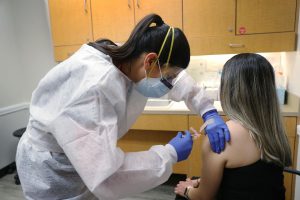Scientists at the Massachusetts Institute of Technology, the Ragon Institute, and Bristol Myers Squibb have been working on a new type of flu vaccine that could possibly protect people against every influenza strain. This universal vaccine has been a long-time pipe dream for immunologists because it would remove from the equation the need to guess which flu strain is will be present in which geographic region. Since so many strains of the flu exist, flu vaccines are largely based on strain prediction, which can be very inaccurate.
The research group working on the universal strain are approaching the vaccine a little differently than in the past. The flu virus is enveloped in hemagglutinin (HA) protein, which is comprised of a head and stalk region. This protein is necessary for the virus to be able to penetrate cells and infect humans. HA has a head region that sits on top of a thinner stalk. Our bodies’ immune systems attack the head region, which is the part of the virus that mutates. To develop a universal flu vaccine that protects against all strains, researchers are focusing on ways to make our immune systems attack the stem rather than the head.
This approach to immunizations likely won’t just be relevant to the flu but could be translated to use in viruses like COVID-19 in the future, which could easily begin mutating into other strains. In fact, live flu vaccines have already shown promise in providing protection against the coronavirus.
Live vaccines, which contain a live, but attenuated version of the virus, have been shown to help fend off a wide variety of other viruses and respiratory infections. The tuberculosis vaccine, for instance, has been proven to boost immune response to the extent that vaccinated children not only have a greatly reduced risk for dying from TB, but also exhibit an overall mortality rate three times lower than non-vaccinated children. Mounting evidence suggests that this is not exclusive to the TB vaccine, but to all “live” vaccines, mostly likely because they trick our systems into producing more antibodies, thus are able to fend off a wider variety of illnesses.
The global pandemic sent researchers scrambling to find answers about the COVID-19 virus, which resulted in several new discoveries about viruses in general and our innate immune responses. With these two recent breakthroughs in mind, relief from COVID-19 looks a little more attainable, even if reached through non-traditional channels.























